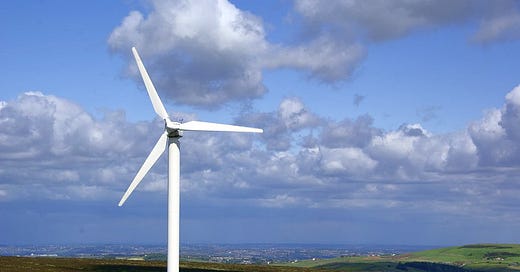Sad but true: Ukraine war speeds up renewables
Germany in particular accelerates its race to green power sources
(A native of England, Matthew Diebel is a veteran journalist who has worked at NBC News, Time, USA Today and News Corp., among other organizations. Having spent his childhood next to one of the world's fastest bodies of water, he is particularly interested in tidal energy.)
With the horrors of Vladimir Putin’s attack on Ukraine growing every day, it may seem somewhat crass to point out some of the catastrophe’s possible climate benefits and opportunities. But, especially given the frightening U.N. climate report released Monday by the Intergovernmental Panel on Climate Change (IPCC), we’ll take any silver lining with can get.
First and foremost, Germany. Also on Monday, the economy ministry proposed new legislation accelerating its already impressive wind and solar power efforts in an attempt to generate almost all the country’s power from renewables by 2035, a massive 15 years ahead of its previous goal. Already an offshore wind leader — only the U.K., with a much longer coastline, leads it in Europe — its seabed turbines in particular are planned to more than double in short order, reports Bloomberg. In addition, its onshore wind capacity is set to increase from 3 GW annually to 10 GW by 2027. Solar expansion will go from 7 GW to 20 GW a year in 2028, according to the plan.
Already under pressure to unshackle itself from Russian fossil fuels, the Ukraine war has sharpened Berlin’s resolve even more, especially since it is due to close the last of its nuclear plants this year as well phase out coal-fired power by 2030. “The Russian war of aggression in Ukraine has increased the urgency,” the legislation document declared, with German Finance Minister Christian Lindner referring to renewable electricity as "the energy of freedom.”
And, apart from sending liquid natural gas to replace the Russian supplies, others are thinking that the U.S. could help in an area in which it is more advanced than Europe: heat pumps. In particular, noted environmentalist Bill McKibben at the weekend urged the White House to “immediately invoke the Defense Production Act to get American manufacturers to start producing electric heat pumps in quantity, so we can ship them to Europe where they can be installed in time to dramatically lessen Putin’s power.“
The U.S. is ahead in heat pumps due to the more extreme conditions of most of its weather — sweltering in summer and freezing in winter — but its manufacturers are facing fiercer competition from Asian sources. In this regard, McKibben suggested U.S. firms could ramp up production quickly with guaranteed federal contracts, with heat pumps provided at low prices to Europeans. He also sees an advantage for Americans beyond the revenue and jobs created. If America did this, it would jump-start our own capacity — which means, as one expert put it, “what you do in Montenegro this year helps in Minnesota two years out,” as we try to wean American[s] from expensive and dirty fossil fuels.”
Cold comfort, of course, for Ukrainians as they battle their aggressor, but glimmers of hope, at least, for the world.



